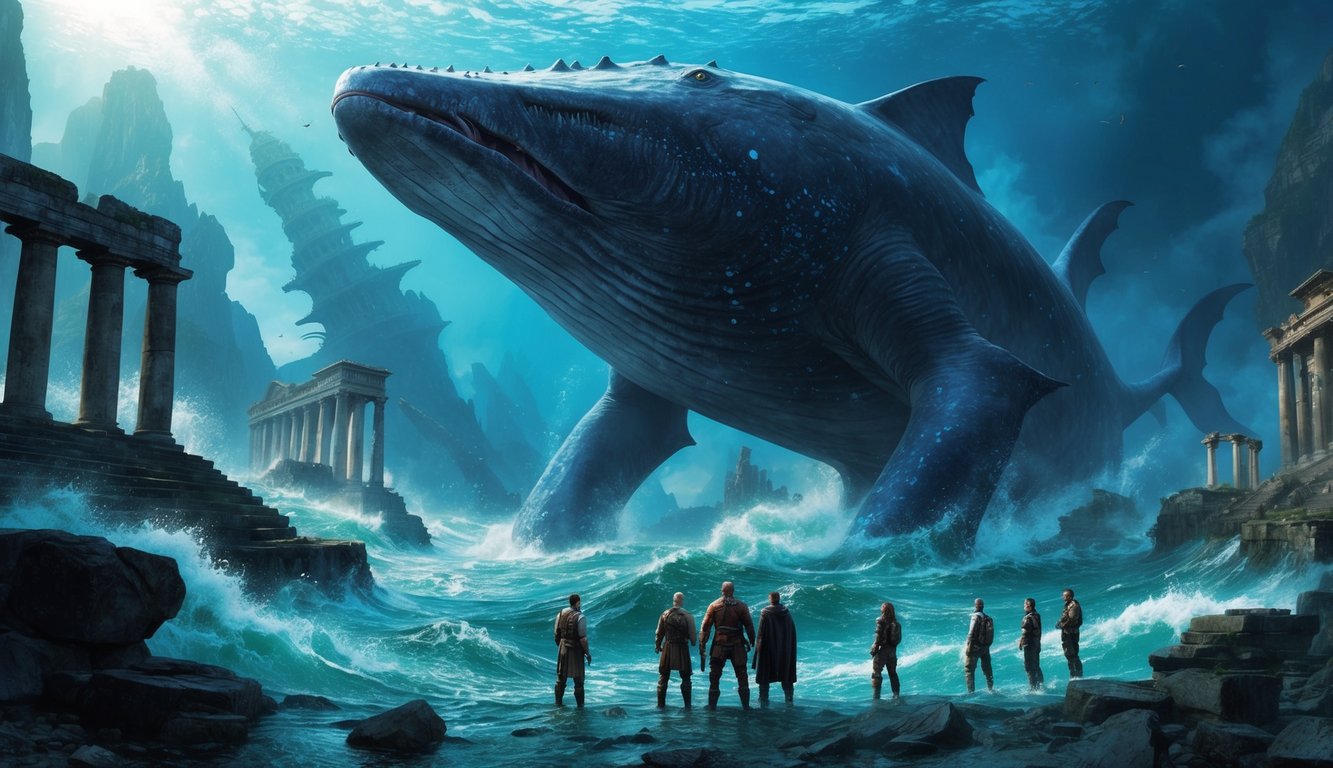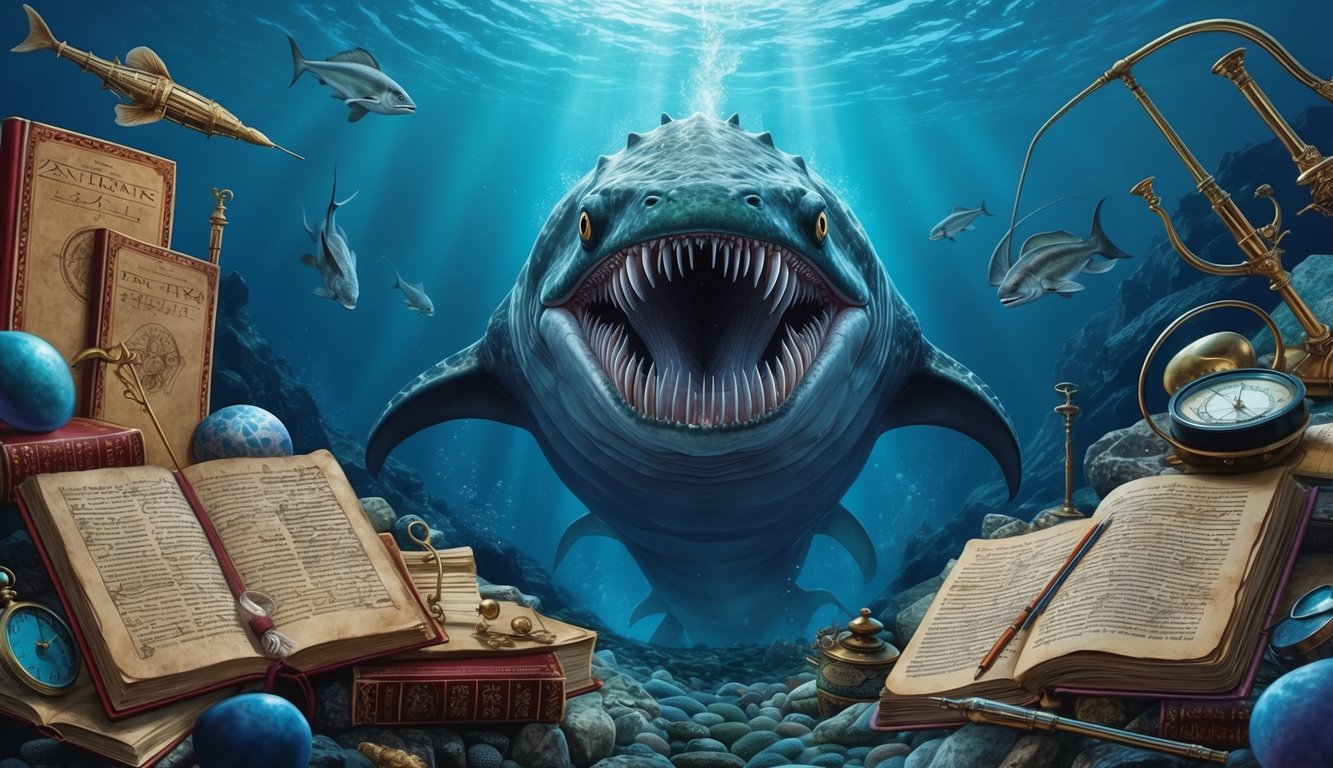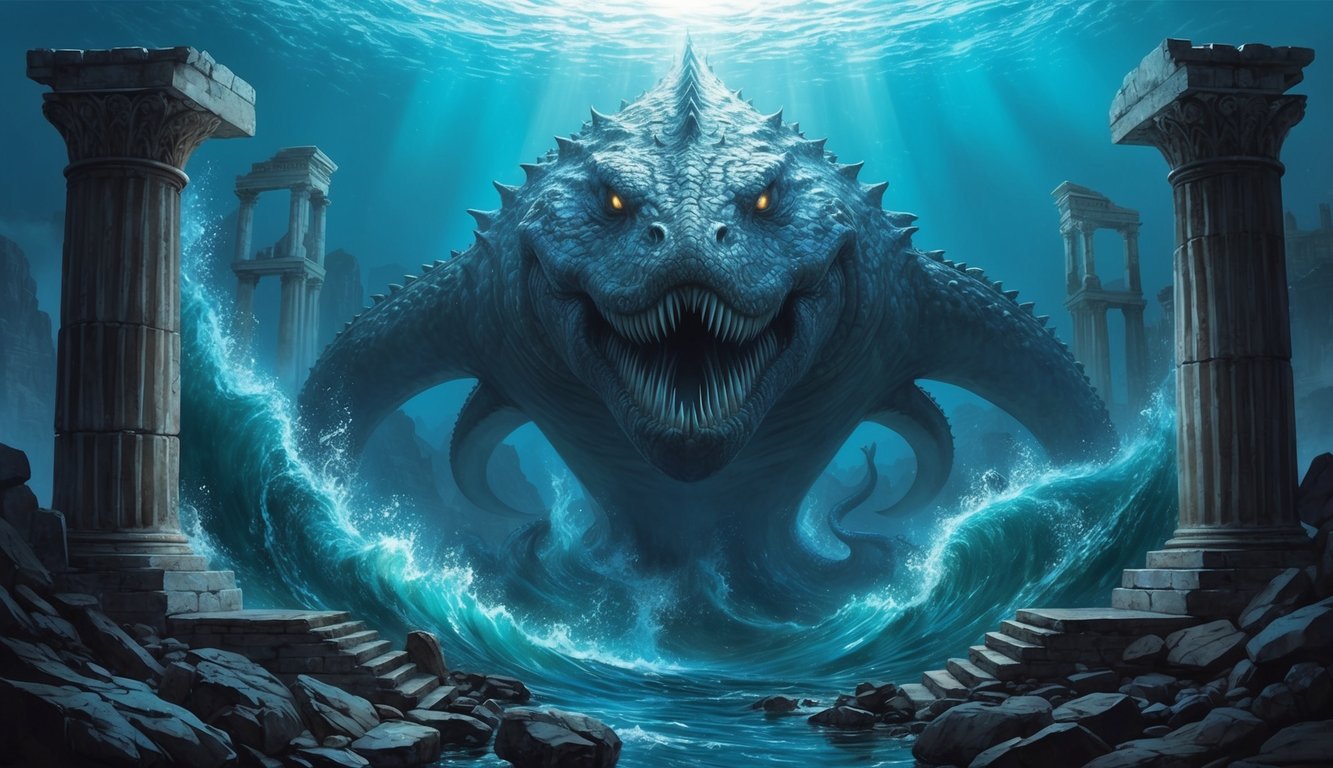Don’t Miss Out On This Unique Astrological Opportunity
Are you tired of spinning your wheels and getting nowhere? Simply put, you’re out of sync: you’re out of alignment with your astral configuration.
But: there’s a kind of map that can help you reclaim your alignment. Think of it as your own personal blueprint to success and happiness: a blueprint that will help you live your most amazing life.
Get started here.
The Leviathan is a fascinating creature mentioned in the Bible, often described as a monstrous sea creature.
You can find references to the Leviathan in the Old Testament, where it serves as a symbol of evil and chaos.
This powerful imagery captures the imagination and invites various interpretations, both theological and cultural.
The Leviathan has been studied extensively in both religious texts and literature, where it is sometimes compared to monsters from other mythologies.
The Leviathan also plays an intriguing role in theological discussions.
From a biblical perspective, it is seen not just as a creature, but as a representation of chaos that God has control over, adding depth to its mentions in scripture.
This interpretation allows you to explore the deeper meanings behind its appearances in texts like the Book of Job.
In addition to its religious significance, the Leviathan has permeated cultural and literary works, often depicted as a powerful sea monster clashing with forces of good.
This enduring myth captures the balance between order and chaos and continues to be a subject of fascination for scholars, writers, and theologians alike.
By examining the Leviathan through these various lenses, you gain a richer perspective of this mysterious creature.
The story of Jonah and the Whale further reflects humanity’s long-standing fascination with massive sea creatures and divine intervention.
Throughout history, the Leviathan has been reinterpreted in literature, from biblical texts to modern fantasy, symbolizing both destruction and the unknown depths of the ocean.
Its presence in various traditions highlights its role as a powerful and enduring myth that continues to inspire new interpretations.
Key Takeaways
- Leviathan is a significant biblical sea monster symbolizing chaos.
- Examines theological interpretations of Leviathan in religious texts.
- Leviathan is featured in various cultural and literary works.
Leviathan in Biblical Scripture
Leviathan appears in several Bible passages, portraying a creature that embodies chaos and power.
You may find descriptions of this formidable being in the books of Job, Isaiah, and Psalms, each offering unique insights into its nature and symbolism.
The Creature Described in Job 41
In the Book of Job, Leviathan is depicted as a mighty creature, unstoppable and beyond human control.
It resides in the sea and is described as having a strong body, impenetrable like iron.
The imagery portrays a creature full of strength and power, one that God alone can master.
Leviathan’s ability to breathe fire and disturb the earth highlights its immense power.
Its monstrous form serves to remind you of the limits of human abilities compared to divine creations.
Job 41 provides detailed imagery, emphasizing Leviathan’s ferocious nature, further depicting it as an embodiment of chaos within the sea, challenging you to ponder the vastness of divine creation.
Isaiah’s Mention of Leviathan
In Isaiah 27, Leviathan is described as a coiling and twisting serpent.
It’s referred to as a fleeing serpent that God will punish with a powerful sword.
This reflects a different symbol of Leviathan, where it represents chaos and evil opposing God.
Here, the creature is seen as a dragon or sea monster that threatens the order of creation.
Isaiah uses this imagery to convey themes of redemption and victory over chaos.
You see Leviathan not just as a physical entity, but as a metaphor for any force opposing divine order.
By vanquishing Leviathan, God asserts control over the universe, showcasing His power to restore creation to harmony.
Psalms and Leviathan
The Psalms also feature Leviathan, notably in Psalm 104, where it is part of the natural world created by God.
Here, Leviathan is seen as one of God’s many creations that frolics in the sea.
Unlike its fiercer depictions, this view presents Leviathan as a creature under God’s command, moving freely in its aquatic domain.
In Psalm 104, Leviathan illustrates the vastness and diversity of God’s creation.
It conveys a sense of balance and coexistence within the natural world, underlining the complexity and interconnectedness of all creatures.
This passage invites you to marvel at the harmony present within the universe, including such mighty beings as Leviathan.
Symbolism and Theological Interpretations
Various religious texts mention the Leviathan, often linking it to power, chaos, and intense fear.
The implications of this creature vary, symbolizing different aspects in Jewish and Christian beliefs.
Leviathan as a Symbol of Chaos
The Leviathan is seen as a sea creature that symbolizes chaos and evil.
In the Old Testament, it’s often depicted as a serpent or a sea monster.
This creature represents untamable forces, threatening the order established by God.
In Jewish texts, Leviathan’s immense strength and power highlight the concept that God’s rule triumphs over the chaotic and unpredictable nature of the sea.
It is a symbol of what lies beyond human control and a reminder of the strength and might of God compared to kings and rulers.
As a symbol, the Leviathan is also closely related to fear and the awe that it inspires in believers, serving as a representation of Satan or forces that oppose divine order.
Leviathan in Jewish and Christian Thought
In Jewish thought, Leviathan is often linked with Israel‘s enemies, such as Egypt and Rahab, symbolizing their oppressive nature.
It embodies threats that Israel must overcome, showing the clash between order and chaos.
In Christianity, the Leviathan might be linked to Satan, seen as a liar and tempter.
This creature embodies rebellion against Heaven and the Wisdom of God’s creations.
The fear of chaos and disorder ties into interpretations of the Leviathan, emphasizing God’s control over the power of evil in the world.
You find the Leviathan often represents a divine symbol with profound theological meanings, covering themes of control, fear, and strength.
Comparative Mythology and Cultural Depictions

In myths across different cultures, creatures similar to the biblical Leviathan appear, often symbolizing chaos or great danger.
These beings are featured in both ancient stories and modern pop culture, showing their lasting impact.
Leviathan’s Counterparts in Ancient Myths
You can find similar creatures to Leviathan in various ancient myths.
In Mesopotamian tales, a powerful sea serpent known as Tiamat plays a role similar to Leviathan.
Tiamat is often depicted as a dragon-like creature representing chaos, which eventually faces the hero god Marduk.
In other cultures, such as Norse mythology, beings like the Midgard Serpent, Jormungandr, appear.
Jormungandr is a massive sea serpent and a child of the god Loki.
This serpent is so large that it encircles the world, symbolizing potential destruction.
In Egyptian stories, the creature Apophis embodies chaos and is known as a giant serpent that threatens the sun god, Ra, each night.
These comparisons underscore the theme of fierce creatures of the sea representing chaos or evil, similar to the Leviathan in the biblical context.
Modern References and Popular Culture
Today, Leviathan and its mythological counterparts continue to inspire stories, movies, and games.
In literature, Leviathan often appears as a mighty sea monster or dragon-like creature, symbolizing immense power or challenge.
Films and TV series sometimes use Leviathan and similar mythical beings to add depth to their worlds.
In modern poetry and novels, these creatures are often metaphors for internal and external struggles.
Video games frequently feature Leviathan as a boss character, drawing on its traditional attributes of being fierce and formidable.
This reflects the cultural influence of Leviathan as an enduring symbol of great force.
These references tie back to its ancient roots and showcase its place in contemporary imagination.
Scientific and Literary Perspectives

The Leviathan has fascinated both scientists and artists for generations.
It is depicted as a mightily strong sea creature with scales like iron and a tail as powerful as bronze.
In literature and art, its monstrous form and fierce eyes have inspired various representations.
Zoological Analysis of the Leviathan
In scientific discussions, Leviathan is often compared to known sea creatures.
Some researchers suggest it could be a representation of a large Sea Serpent or a Crocodile.
Its iron-hard scales and strong tail have led many to think it depicts something beyond our modern zoology, possibly a creature of unique and mythical status.
The creature’s immense form and strong features pose questions about ancient perceptions of monsters and creation myths.
Among the most curious traits are its formidable teeth and enduring structure.
Descriptions emphasize the creature’s supposed eye brightness and its powerful aquatic prowess, leading some to connect it with mythological Sea beasts.
While many interpretations arise, the natural sciences remain intrigued by this mysterious figure featured prominently in ancient texts.
Literary and Artistic Representations
In literature, the Leviathan is often illustrated as a dramatic metaphor for chaos and power.
Artists have captured its monstrous form, highlighting its feared scales and distinct, fierce eyes.
This creature becomes a symbol of unconstrained energy, often battling other cosmic forces.
Writers like Thomas Hobbes, in works such as Leviathan, utilize it to explore themes of political power and control.
By merging historical perspectives with contemporary ideas, these portrayals create a rich tapestry where the Leviathan stands as an emblem of strength and mystery, reflecting human fascination with the unknown and the monstrous.
Frequently Asked Questions

In biblical literature, Leviathan is often depicted as a powerful sea creature with deep symbolic meaning.
It appears in various parts of the Bible, offering insight into its significance and varied interpretations.
What does the Leviathan represent in biblical context?
Leviathan often symbolizes chaos and destruction.
In some texts, it represents the forces of evil that God must overcome.
Additionally, Leviathan can symbolize God’s power and control over creation, as it is depicted as being under divine constraint.
In which parts of the Bible is Leviathan mentioned?
Leviathan is referenced in several books of the Bible, including Psalms, Isaiah, and Job.
These passages portray it as a creature of great strength and mystery, serving different narrative purposes in each context.
How is Leviathan described in the Book of Job?
In the Book of Job, Leviathan is described as a formidable and untamable creature.
This depiction emphasizes God’s might and wisdom, as even a creature like Leviathan is under His command.
The detailed description highlights its fearsome nature and invincibility.
What is the significance of Leviathan in biblical literature?
Leviathan serves as a symbol of God’s sovereignty and the struggle between order and chaos.
Its appearances in scriptures remind readers of the ongoing battle between divine intent and chaotic elements, emphasizing the theme of divine control over the natural world.
How does the interpretation of Leviathan differ between modern and historical perspectives?
Historically, Leviathan was seen mainly as a literal creature or a mythological symbol of chaos.
Modern interpretations often explore it as a metaphor for deeper psychological or spiritual themes, reflecting shifting cultural and theological perspectives.
What are some theories about the symbolic meaning of Leviathan and Behemoth mentioned in the Bible?
The symbolism of Leviathan and Behemoth often represents the struggle between chaos (Leviathan) and order (Behemoth).
Some theories suggest these creatures highlight humanity’s limited power compared to divine forces or represent the natural world’s unpredictable and uncontainable aspects.



